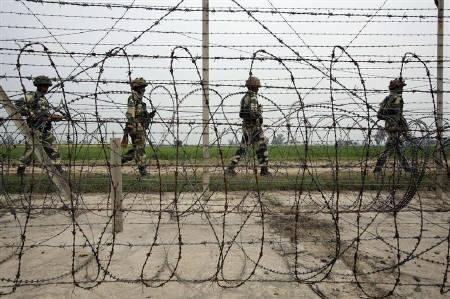BJP Says Pakistan is 'Shaitanistan' For Escalating Border Tensions
Tensions between India and Pakistan have escalated with cross-border firing that has killed

NEW DELHI: As cross border firing between India and Pakistan enters the third day on Wednesday with both sides accusing the other for the provocation, BJP spokesperson Mukhtar Abbas Naqvi referred to Pakistan as “Shaitanistan” for escalating border tensions.
Naqvi’s comment comes as both sides report further casualties. India reported that fresh Pakistani fire had killed one woman and injured six people in Samba. Pakistani media reported that two people were killed in Sialkot’s Chaprar sector late Tuesday, and one person succumbed to injuries Wednesday morning in the Charwa sector of Sialkot.
The firing began on Monday, with five Indian civilians and four Pakistani civilians being killed overnight in the cross-border exchange.
Both sides have accused the other of “unprovoked firing.” Indian Defence Minister Arun Jaitley pinned the blame on Pakistan for the firing, that has brought to an end a month long lull in cross-border firing along the Line of Control (LOC). “Pakistan must realize that the kind of environment it is generating between the two countries is certainly not going to help in normalizing the relations. The onus of creating a positive environment is on Pakistan, which is utterly failing to do so.”
India’s Home Minister Rajnath Singh reiterated that there was a change of guard of India, and as such, “Pakistan should stop cease-fire violations and should understand the reality that times have changed in India.”
Pakistan condemned India’s actions, saying that it had lodged a “strong protest” through diplomatic channels. "This was the sixth violation, occurring on a daily basis since October 1… Indian Forces violated [the ceasefire] from Akhnur, Dawar, Gulmerg, Jammu, Dawar and lastly, from Charwah Sectors," Tasneem Aslam, spokesperson for Pakistan’s Foreign Office said in a statement. The statement further called upon India to restrain itself from “constant violation of the ceasefire.”
Tuesday’s firing is the 17th ceasefire violation along the LOC since October 1, with September seeing a lull after much of August was witness to heavy exchanges of gunfire and shelling between border posts and left at least six people dead. This round of firing coincides with the festival of Eid, with the Pakistan Foreign Ministry statement saying that India’s actions were “in complete disregard” of the festivities. "It is deeply saddening that Indian Security Forces’ act of aggression deprived a number of families from celebrating Eid," the statement said.
Eid, however, follows a devastating flood in Kashmir that left hundreds dead and caused irreparable damage. The resumption in firing only added to the gloomy atmosphere, leading to thousands fleeing their homes in the villages along the disputed border.
The firing itself follows escalated tensions between the two nuclear neighbours ever since the cancellation of secretary-level talks over Pakistan’s decision to meet Kashmiri separatist leaders in August. The talks had signalled the prospect of renewed ties between the two countries, after Indian Prime Minister Narendra Modi invited Pakistani counterpart Nawaz Sharif to attend his swearing-in ceremony, with the two leaders meeting in New Delhi on the same occasion.
Speaking at the United Nations last month, Sharif said that India’s decision to cancel the talks had resulted in a “missed opportunity.” Modi, speaking at the UN the next day, responded saying that India was not opposed to talks, but would not participate “in the shadow of terror” and that it was upto Pakistan to “create a conducive atmosphere for talks.”
The recent firing is indication that that atmosphere is no where near.



